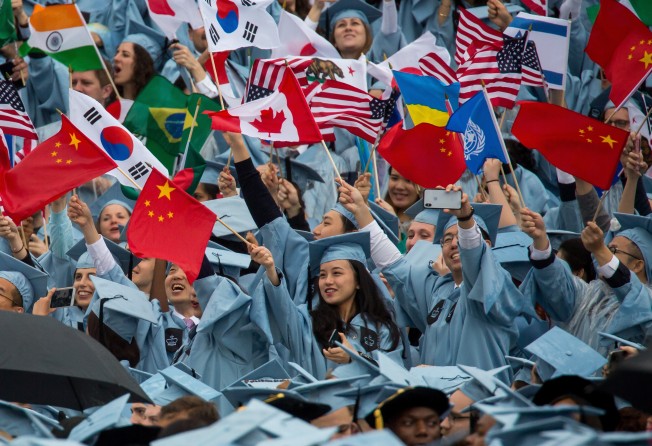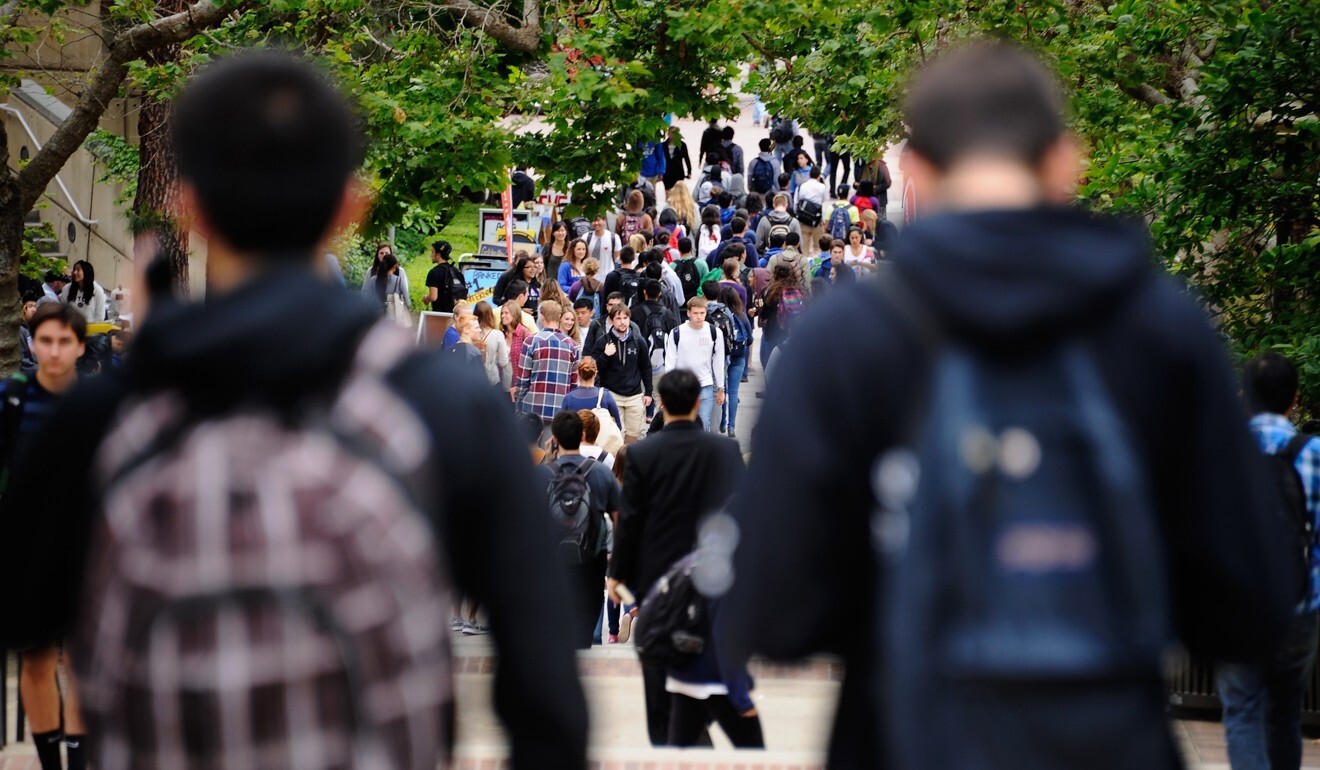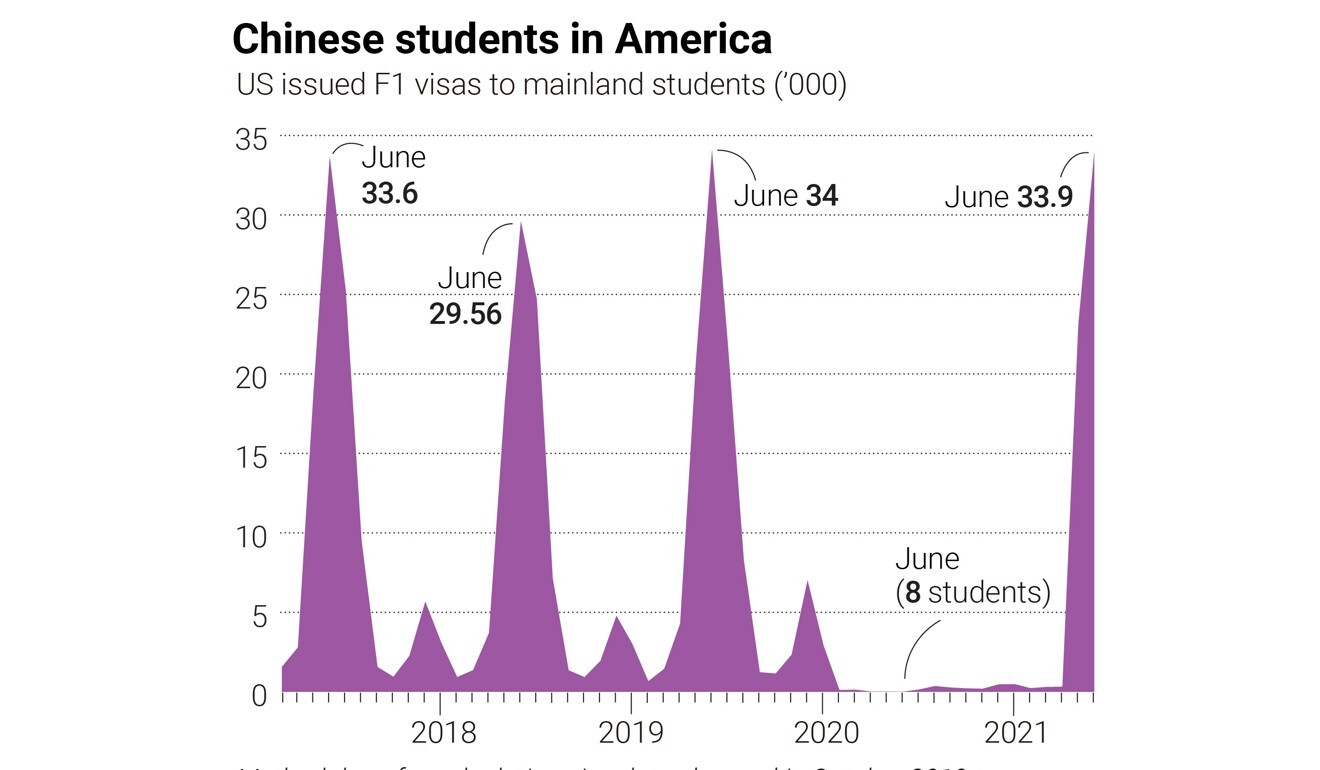
01:25
US colleges face US$15 billion hit as Chinese students stay away amid coronavirus pandemic

The number of new international students at US universities last year plummeted to nearly half their pre-pandemic levels, but Chinese students continued to vastly outnumber any other group.
New foreign student enrolments during the 2020-21 year dropped by about 46 per cent compared to 2019-20, pulling the overall number of international students at US universities down by 15 per cent to some 914,000, according to a new government-funded study released Monday by the Institute of International Education (IIE).
While dropping for the first time in almost two decades, the number of mainland Chinese students at US higher education institutions still topped the rankings with some 317,000 individuals, even as Beijing complained of increasingly restrictive visa policies affecting Chinese applicants.
That was almost double the amount of students from India, the second-highest ranking country of origin.
The findings underscored the sweeping impact of the Covid-19 pandemic, which upended higher education as it has most other sectors.

01:25
US colleges face US$15 billion hit as Chinese students stay away amid coronavirus pandemic
According to Allan Goodman, the IIE chief executive, Covid-19 is the 12th pandemic to have occurred during the institute’s 100-year history. Goodman said that precedent suggested a swift rebound in enrolments would come as the pandemic lifts.
“When [a pandemic is] controlled or when it’s over, there is a surge of the kind we very much hope to see, because people have deferred their dream to study abroad but haven’t abandoned it,” said Goodman, speaking to reporters alongside US government education officials.
Indeed, preliminary research into international student levels this autumn found that new enrolments were up 68 per cent, signalling what IIE’s head of research, Mirka Martel, called the “resilience” of US higher education.
That same study also found that, as they scrambled to recover from pandemic lows, colleges and universities were focusing their recruitment and outreach efforts on India and China.
China’s continued dominance of the country-of-origin rankings comes despite the Biden administration’s maintenance of a Trump-era policy blocking entry for graduate students with purported ties to military-backed institutions.
Beijing has complained repeatedly and earlier this year included the visa denials in a list presented to US officials of policies that the Chinese government has demanded that Washington change.
The visa restrictions maintained a “poisonous legacy of the Trump administration,” a foreign ministry spokesman said in July, adding that the limits had “gravely undermined” educational cooperation between the two countries.
Announced in May 2020, the policy targets students with any present or past ties to institutions connected to China’s “military-civil fusion strategy”, generally referring to a group of seven leading Chinese universities closely affiliated with the People’s Liberation Army.
Three months after its enactment, the US State Department said it had blocked the visas of more than 1,000 Chinese nationals under the policy’s authority.
The State Department did not respond to a request for an updated figure, but a February report by Georgetown University’s Centre for Security and Emerging Technology estimated that the policy could block up to 5,000 students annually from taking US graduate programmes in science, technology, engineering or mathematics.

That number would constitute more than a quarter of Chinese students who start STEM graduate programmes in the US each year.
University officials have raised concerns about the policy’s potential to stifle US innovation. That is in addition to the significant impact graduate students have on the US economy, either through tuition fees or patents developed during their time at American institutions.
The policy’s criteria were “overly broad” and did not address the risk of students on an “individual basis”, researchers at the National Foundation for American Policy wrote in August.
Defending the Biden administration’s continuation of the Trump-era policy, Ethan Rosenzweig, deputy assistant secretary of state for academic programmes, said that the US was able to “welcome students and protect our national security at the same time”.
“We are committed to ensuring that students from around the world can come to the United States,” Rosenzweig said, adding that the administration’s concerns over what he called “research integrity” only affected a “very small number of students”.
The administration had sought to prioritise the processing of student visas following a pause in routine visa operations during the pandemic, said Rebecca Wall, an official with the State Department’s bureau of consular affairs.

The government has issued almost 90,000 student and exchange visas for Chinese applicants in the months since visa processing was restarted in May.
Highlighting those visas, Wall said: “Even though Covid-19 has drastically impacted the way we travel and study, because of the significance of student visas we really have been able to continue to meet that demand, including for Chinese applicants.”